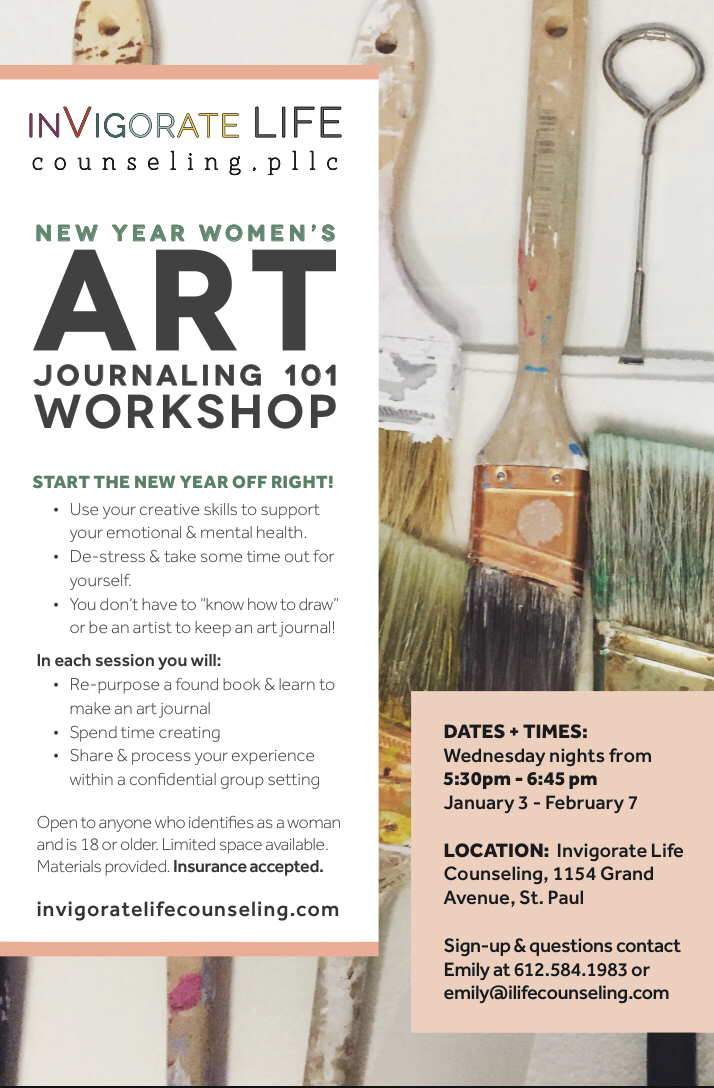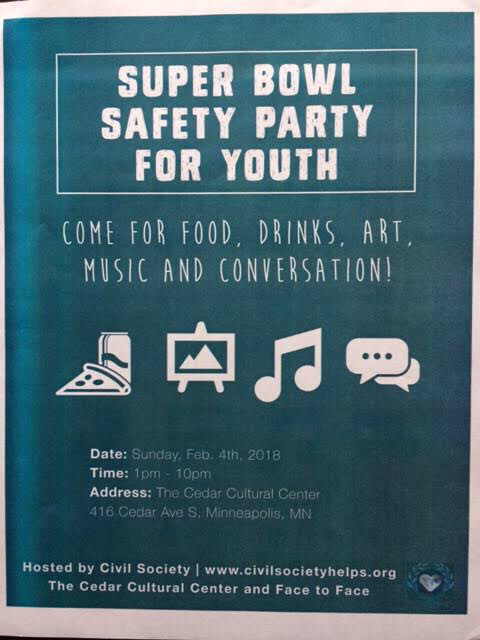"What Is Art Therapy? And How Is It Helping People?"
0 Comments
From Whitehouse.gov
The White House Office of the Vice President For Immediate Release February 13, 2017 Second Lady Karen Pence Receives Courage Award Tonight, Tracy’s Kids Art Therapy Program honored Second Lady Karen Pence with the Courage Award for her support of art therapy programs across the United States and world. She received the recognition at the annual fundraiser called, “And the Winner is…Tracy’s Kids,” an event supporting a charity that employs art therapy to help young cancer patients cope with the emotional toll imposed by cancer and its treatment. The Courage Award honors the strength, dignity and perseverance that cancer patients exhibit every day, and is presented to a public person who has worked to address the challenges inflicted by the disease. “I am humbled by the recognition and grateful for the opportunity to be involved with an organization with such an important mission of providing art therapy to children with cancer,” said Mrs. Pence. “Tracy’s Kids is truly making a difference throughout our country and it’s encouraging to know that their art therapy programs are bringing a sense of hope to children and their families battling through a difficult period in their lives. I am honored to receive the Courage Award and will continue to help art therapy programs further their efforts and reach more families in our country and world as the Second Lady of the United States.” Mrs. Pence has served on the board of Tracy’s Kids since 2011 and also serves as the Honorary Chair of the Art Therapy Initiative at Riley Hospital for Children in Indianapolis, Indiana. In 2014, through a charitable foundation she founded while serving as the First Lady of Indiana, Mrs. Pence presented Riley Hospital for Children with a check in the amount of $100,000 to support their art therapy program. She has also made it a priority to visit hospitals in the U. S. and other parts of the world when she travels abroad in order to get an up close look at art therapists in action as they are helping children. Mrs. Pence acknowledges that what art therapists do for the children and their families is critical to their healing, both emotionally and physically and appreciates the work they do to make a positive difference in their lives. Tracy’s Kids art therapy program is provided at no cost to the children and families they serve at seven separate clinics: Medstar Georgetown University Hospital, Children’s National Medical Center, Children’s Hospital/Physicians Specialists of Virginia, Inova Children’s Hospital, Methodist Children’s Hospital in San Antonio, New York Presbyterian Hospital and Children’s Hospital at Sinai, Baltimore. 7 of 10 MN Members of Congress Sign On to Push for Increase for National Endowment for the Arts4/5/2017 Seven of Ten of Minnesota's Members of Congress Sign On to Increase Funding to NEA
Good news for those of us battling against the elimination of the National Endowment for the Arts. Seven of Minnesota's members of Congress are not only opposed to eliminating the National Endowment for the Arts - they are asking for an increase in funding. Congresswoman Betty McCollum (DFL, District 4 - St. Paul) is the lead Democrat on the Interior Committee which funds the NEA, NEH and other cultural agencies, and is hard at work organizing her peers to support and increase funding for the cultural agencies. She is working with Americans for the Arts on building more support. (Photo: Rep. Betty McCollum) Over in the Senate, Senators Al Franken (D-MN) and Amy Klobuchar (D-MN) both signed onto a "Dear Colleague" letter circulated by the Senate Cultural Caucus, which is co-chaired by Sen. Mike Enzi (R-WY) and Sen. Tom Udall (D-NM). The letter asked for an increase for both the NEA and NEH to $149.8M for fiscal year 2018. Representatives Tim Walz (D - Southern MN), Keith Ellison (D - Mpls), Colin Peterson (D - Western MN), and Rick Nolan (D - Northern MN) all signed on to a "Dear Colleague" letter circulated by the House Art Caucus, co-chaired by Rep. Louise Slaughter (D-NY) and Rep. Leonard Lance (R-NJ). Their letter asked for an increase for the NEA to $155M for fiscal year 2018. FY 2016 funding for the NEA was just short of $148M.If your member of Congress doesn't show up on this list, ask them to support the arts here:https://www.votervoice.net/ARTSUSA/campaignsThank you Representatives McColllum, Walz, Ellison, Peterson and Nolan and Senators Franken and Klobuchar! Learn More.... artsmn.org  © Heather Matson 2011 © Heather Matson 2011 Dear supporter of the Art Therapy Profession, The Minnesota chapter of the American Art Therapy Association (MNATA) is collecting letters of support for the art therapy profession to pursue licensure in our state. We are asking organizations and professionals to write letters to support the art therapy profession. The information collected will assist our efforts in gaining a specialized Art Therapy license in MN that will protect consumers and providers of the art therapy profession. Additionally, these letters will help us gain a better understanding of how art therapy is being used in the general mental health profession and community. In order for art making to be called art therapy, it must utilize both art and therapy, and must be led by a clinician trained in both. Filling leisure time with art activities, where the primary goal is fun and learning, may be therapeutic, but it is not art therapy. The primary purpose of the art activity must be therapy, usually including assessment, as well as treatment. The therapist must know art materials and how they can aid in helping the person grow and develop. Art therapy practice requires specialized Master’s level training and knowledge of visual art and the creative process, as well as of human development, psychological, and counseling theories and techniques. Art Therapists are also extensively trained in dealing with the effects of art materials and interventions so as to avoid regressive or harmful effects to individuals’ personal growth and well-being. At this time, in absence of a specialized Art Therapy license, art is often utilized in practice by non-art therapy trained practitioners and the boundary of what is considered “therapeutic skills using art,” and “Art Therapy” continues to be blurred. An Art Therapy license would reflect the uniquely complex educational journey of Art Therapists and protect consumers by assuring safe and professional Art Therapy services. Our neighbors Wisconsin, and recently Iowa, have joined five states that have enacted distinct art therapy licenses, and four states that authorize art therapists to be licensed under other related mental health licenses. The state of Minnesota statue 214.001 Subd. 3.3, title protects the use of “Art Therapy” and “Art Therapist” by defining “Registration” as a “system whereby practitioners who will be the only persons permitted to use a designated title are listed on an official roster after having met predetermined qualifications.” (https://www.revisor.mn.gov) Minnesota leaders recognize the unique benefits to art therapy as a service and a profession, Governor Mark Dayton proclaimed July 7-12, 2015, as Art Therapy Week (http://mn.gov/govstat/images/Art_Therapy_Week.pdf). As the public becomes aware of the benefits of art therapy, with the addition of sufficient numbers of qualified credentialed art therapists, the need to necessitate specialized licensure of art therapists working in Minnesota becomes clearer. On November 29, 2001, following the terrible tragedies of September 11th, Hillary Clinton’s Congressional Record Statement in support of art therapy states, “And that is why I rise today to encourage my colleagues in Congress to support the field of art therapy and expand awareness about this creative form of treatment. At this time of heightened awareness about the importance of maintaining mental health, we should recognize art therapy as a way to treat those among us who have experienced trauma.” (Congressional Record – Senate. S12154, November 29, 2001) This statement helped launch a new level of awareness and job growth for art therapists in the United States. The American Art Therapy Association (AATA) announced on August 10, 2016 “U.S. Bureau of Labor Statistics (https://www.bls.gov/home.htm) has released a preliminary listing of Standard Occupational Classification (SOC) codes to take effect on January 1, 2018, that will classify art therapists within the 29-0000 occupation group for Healthcare Practitioners and under a 29-1129 sub-code for “Therapists: All Other.” Art therapy has been inappropriately classified under the occupational code for recreational therapists. This represents a significant “win” for art therapists and an important step forward in defining art therapy as a distinct profession on a federal level. Influenced by AATA and other states pursuing an art therapy license, below are reasons why an art therapy license is a win-win for both the profession and consumers of art therapy services in our state. Benefits to an Art Therapy License in Minnesota: + Is required to practice + Protects consumers and providers + Prevents potential harm by ensuring non-trained professionals do not practice outside their scope of education and qualifications + Promotes essential growth of a specific practice; something all mental health professionals must undergo + Sustains equality and representation + Ensures growth, necessary refinement, and adherence to state laws and regulations + Influences policy making and standards of practice + Qualifies practitioners for reimbursement from insurance companies + Ensures quality of art therapy services by a specifically trained and experienced provider + Provides a distinct service and reimbursement code under public and private insurance for which art therapists are qualified. + Enables art therapists to provide their distinct services within state law + RECOGNIZES ART THERAPY AS AN IMPORTANT, UNIQUE MENTAL HEALTH PROFESSION. The Minnesota Art Therapy Association encourages professional supporters like yourself to join our licensing efforts by writing a letter of support on your organizations letterhead. Please state why you and your organization support the art therapy profession… How art therapy has helped your community… Have you witnessed or experienced any risks with the use of art therapy (HIPPA, confidentially, or ethical violation, false advertising, therapist practicing outside of their scope, etc.)? In addition, we enclosed a template statement form for consumers of art therapy services to voice their experiences and support. All letters of support will be compiled as evidence towards the argument of a specialized art therapy license for the state of Minnesota. To help maintain confidentiality for consumers give consumers the opportunity of how they would like to be represented (name, initials, anonymous) and would suggest that their therapist coach them through their responses. We would appreciate receiving letters by June 2nd, 2017. Please submit letters, follow our progress and/or contact us directly at [email protected] Or Anonymously upload HERE or visit the MNATA website or Face Book and follow our Blog! Sincerely, Heather Matson, MA, LMFT, ATR-BC Vice President Licensure Committee Co-chair Juliana Thrall, MPS, ATR Treasurer Licensure Committee Co-chair Nikki Witt, MA, LPCC, ATR-BC MNATA President Theresa Hoglund Meuller, MA, LPC, ATR Governmental Affairs Chair The Minnesota Art Therapy Association (MNATA) is a local organization of art therapy professionals who work in collaboration with the American Art Therapy Association (AATA) to provide leadership and guidance to a growing and diverse physical and mental health field. MNATA endeavors to stand for and support the art therapy community and the individuals we serve. "Thus, we genuinely embrace people regardless of race, color, religious or spiritual beliefs, age, national origin, ancestry, disability, socioeconomic status, marital status, immigration status, political views, former or current military status, sexual orientation, gender, gender identity, and gender expression, as well as new identities as they emerge" -AATA. We value our work to engage, embrace and help all people regardless of appearance, career, interests, beliefs or status. We strive to strengthen awareness of diverse communities and uphold an inclusive learning, helping and reinforcing environment. -MNATA The AATA is entrusted to provide leadership and assistance to engage a growing and diverse membership of trained and culturally proficient professional art therapists whose services are valued, appropriately compensated, and considered essential to the public in mental health, healthcare, education, arts, and community programs. The following iterates the core values of the Association. · We strive for solidarity with the art therapy community and those we serve. Thus, we genuinely embrace people regardless of race, color, religious or spiritual beliefs, age, national origin, ancestry, disability, socioeconomic status, marital status, immigration status, political views, former or current military status, sexual orientation, gender, gender identity, and gender expression, as well as new identities as they emerge. · We advocate for the dignity, self-worth, well-being, and creative potential of all people and in the development and provision of art therapy to the public. · We maintain commitment to strengthening AATA’s institutional cultural proficiency, and welcome and engage people of diverse backgrounds and members of diverse communities within the Association’s Board of Directors, staff, volunteers, members, and prospective members. · We strive to be an inclusive learning-centered organization that respects and incorporates the perspectives and contributions of our members, thereby integrating the needs and viewpoints of diverse communities in the design and implementation of our strategic plan. · We uphold social justice and sustainability through awareness, practice, and affirmation that all people deserve equal economic, environmental, healthcare, political and social rights and opportunities. · We maintain awareness of the social and environmental consequences of human actions on any community, ecosystem, and association, with the aim of advancing a sustainable and just society. * This DRAFT Values Statement is open for commentary and input by members of the AATA. All responses will be thoroughly considered. When responding, it is helpful to include alternative phrasing or words to help us better understand your meaning and rationale. Please submit your input to us at [email protected], with the subject line, “AATA Values Statement,” by February 23rd, 2017. We look forward to hearing from you. Original FaceBook Post Click Here... In response to an article about Karen Pence days prior...
"AATA January 26, 2017 The Second Lady of the United States, Karen Pence, has embraced art therapy for children and families as her signature cause. Art therapy is featured on her official website at WhiteHouse.gov. READ MORE..." Celebrating National Arts and Humanities Month with an Eye to a New Cast of Characters - Reblog10/9/2016 THE BLOG Celebrating National Arts and Humanities Month with an Eye to a New Cast of Characters 10/05/2016 10:05 am ET Robert L. Lynch President and CEO, Americans for the Arts October means something very important to the arts world and to communities throughout the United States—National Arts and Humanities Month, a month to reflect on the many ways the arts and humanities contribute to our society. This year there is a sense of urgency. We are at the edge of a changing political tide, whereby elected leaders and administrations will change and support mechanisms for the arts will necessarily evolve. We have one last shot in 2016 to show our future elected leaders the importance of the arts in America. The coast-to-coast celebration was born of a joint effort by Americans for the Arts and the National Endowment for the Arts (NEA) thirty years ago, in honor of the NEA’s twentieth anniversary. President Reagan proclaimed National Arts Week and urged Americans to observe it with programs, ceremonies, and activities. Then, it focused public attention on arts in the community. In 1993 the celebration expanded to a month-long celebration that included the humanities with the arts and has been so ever since, but President Reagan’s words at the inaugural celebration still echo today. We have come to expect a presidential proclamation every year with a show of support and encouragement to unleash creativity and reach for new heights, and this year is no different. We can only hope that our next president values the arts in the same way—and it’s up to us to remind elected officials, during this month dedicated to showcasing the value of the arts. With 78 percent of Americans having a social media profile, showcasing the value of the arts is easier than ever. This year, our #ShowYourArt social media campaign is featuring a unique theme every day in October, and individuals and organizations are encouraged to share their images and personal stories on Instagram. You can get involved and share the art you love from the comfort of your own home or office. Our National Creative Conversation—open to the public and held on Facebook on October 25—will bring together arts advocates and community leaders from across the country to discuss challenges and issues the arts face in their communities. Furthermore, our own Best Businesses Partnering with the Arts in America gala and our National Arts Awards happen annually during National Arts and Humanities Month. We are working to do our part—and so are many others. Encompassing a broad spectrum of America are shining examples of organizations and artists which put their own creative twist on the occasion. The National Veterans Creative Arts Festival showcases artistic achievements of Veterans from across the country in a grand finale stage and art show—the culmination of talent competitions in categories of art, music, dance, drama, and creative writing—for Veterans treated in the Department of Veterans Affairs national health care system. Metro Nashville Arts Commission and NowPlayingNashville.com host Artober Nashville, one of the South’s single-largest cultural celebrations, which engages an estimated 400,000 Nashvillians with events in visual and performing arts, music, craft, film, and more. The event elevates the awareness of the city’s diverse cultural landscape and emphasizes how the entire community can enjoy the arts, from world-class galleries to street corners. YMCA is getting involved too. In an effort to help more people realize the positive benefits that the arts have on youth and adults, more than 300 YMCAs nationwide annually hold Arts Week in conjunction with National Arts and Humanities Month. Budding artists have an opportunity to explore art expression and showcase their own creative works through a variety of programs and presentations by local artists. These and myriad activities nationwide are helped tremendously by support from elected officials, and their support of local, state, and federal funders like the NEA is a critical piece, too. Over its 50 years of promoting cultural heritage and vitality throughout the United States, the NEA has helped to build a cultural infrastructure of arts agencies in every state, including more than 95,000 nonprofit arts organizations, and 4,500 local arts agencies in cities throughout the country. Thanks to the NEA, arts activity has grown in areas of the nation that were previously underserved or not served at all, especially in rural and inner-city communities. The next president will be presenting a budget proposal to Congress in February, and it remains to be seen what level of support the NEA and all the other federal cultural agencies and programs will get. Future funding decisions will be greatly impacted by whom is elected to office—from president, to Congress, to governors and county boards. The arts tell our collective story and connect us into one vibrant community. We want this month to celebrate the breadth and impact of the arts, and the more participation from all levels, the more attention and awareness the arts community will get. Between now and November 8, we need to make our voices heard. Let’s show our future elected officials the value of the arts, and collectively stand up for the arts in America! Follow Robert L. Lynch on Twitter: www.twitter.com/Americans4Arts AATA
October 6, 2016 The American Art Therapy Association and our friends at Americans for the Arts are celebrating October as National Arts and Humanities Month! President Obama has already kicked things off by issuing an official White House Proclamation that articulates the importance of the arts and culture in our history and in our future. He states, “In many ways, the arts and humanities reflect our national soul. They are central to who we are as Americans—as dreamers and storytellers, creators and visionaries. By investing in the arts, we can chart a course for the future in which the threads of our common humanity are bound together with creative empathy and openness.” Get Involved
Art therapists are uniquely positioned to speak on the role of the creative arts in mental health, a topic of great importance for individuals, communities, organizations, and legislation. Join us in promoting National Arts and Humanities month and raising awareness for the importance of the arts! |
Archives
October 2018
Categories
All
|
Minnesota Art Therapy Association

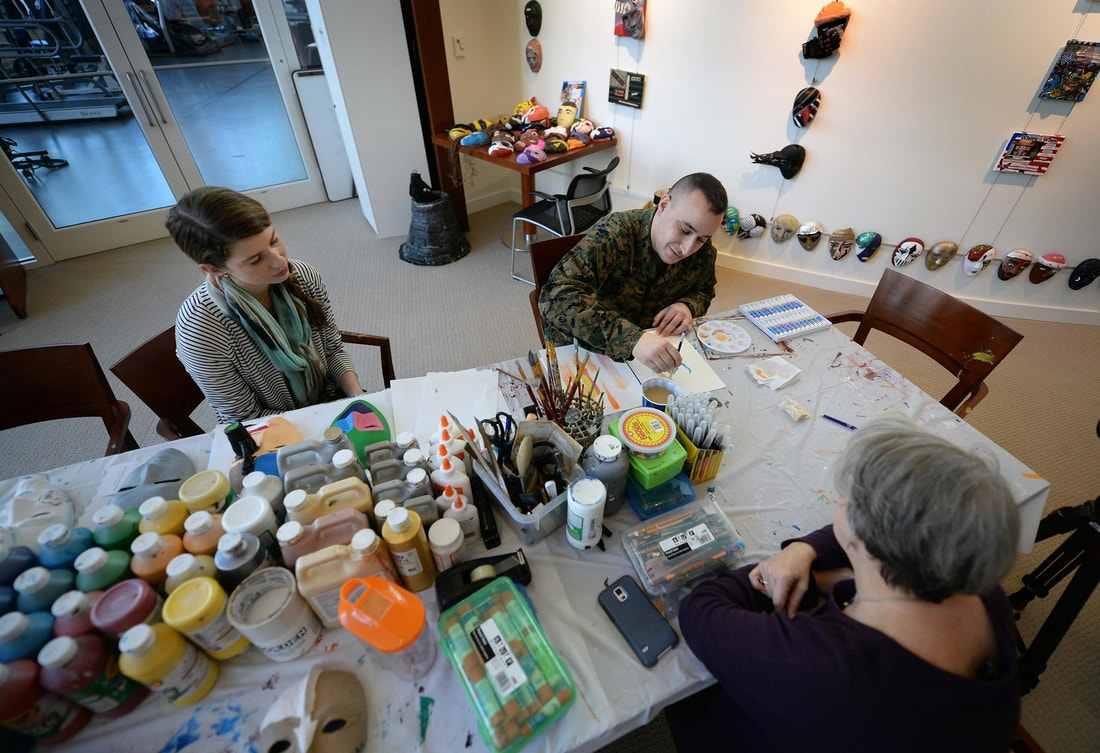

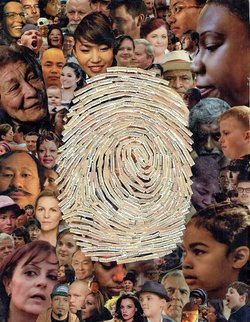
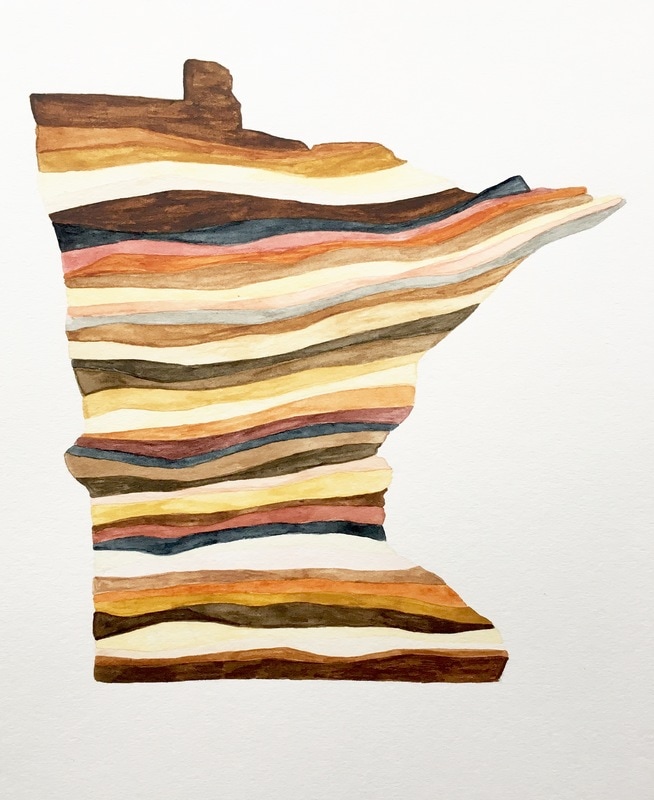
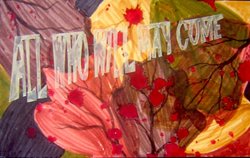
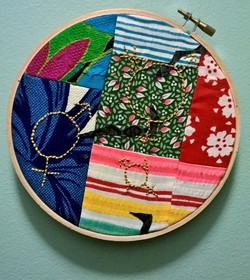
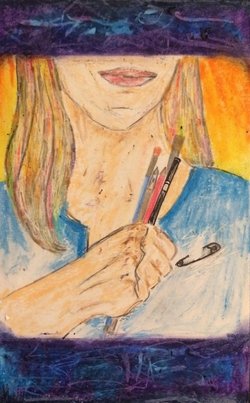
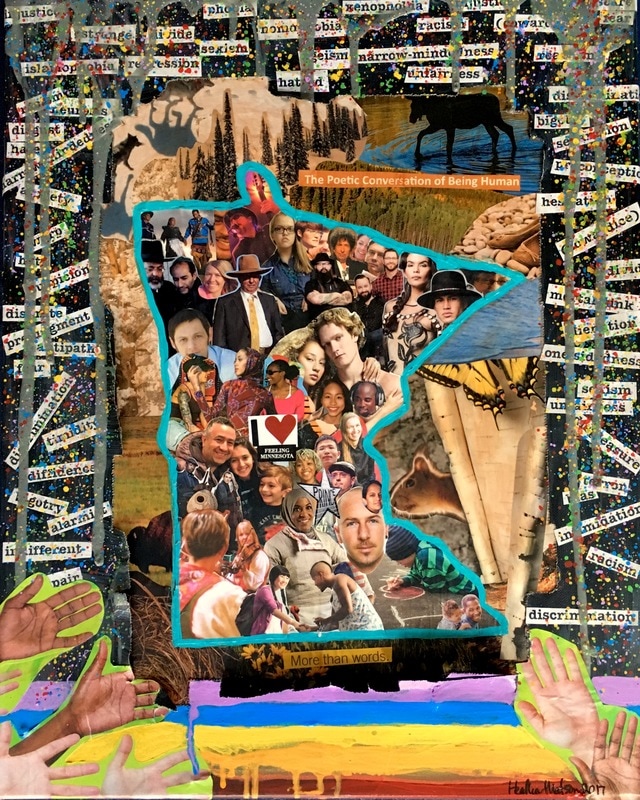


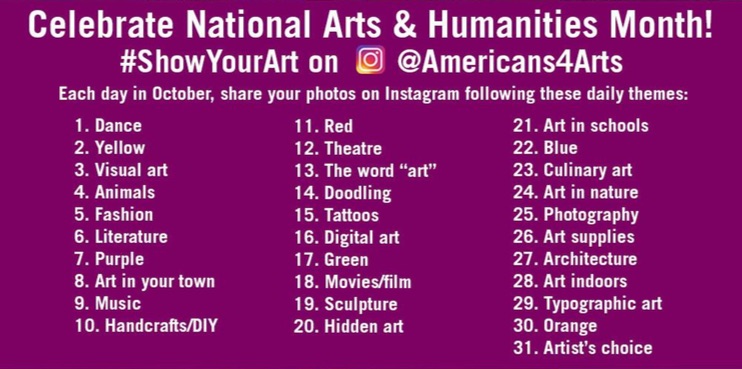
 RSS Feed
RSS Feed
